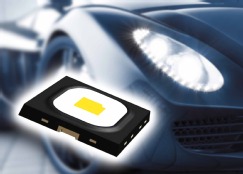Virtually constant light output even at high application temperatures
The Oslon Black Flat is the new LED from Osram Opto Semiconductors for automotive frontlighting systems. Equipped with state-of-the-art chip and packaging technology and a ceramic converter, this new LED product from the famous Oslon Black series is a high-performance light source for automotive applications. It offers high light output even at high currents, uniform distribution of light, thermal stability and particularly good contrast for seeing and being seen. Oslon Black Flat had its premier as a prototype at ISAL 2011 and is available now.

Light sources for frontlighting have to be multitalented. Not only do they have to illuminate the road ahead reliably in rain and fog and at night, they have to perform various functions as low beam, cornering lights and fog lights for example. At the same time, they have to withstand high temperatures in the headlights. For these reasons more and more automobile manufacturers are opting for flexible, efficient and powerful LED technology. Oslon Black Flat is the latest addition by Osram Opto Semiconductors to its Oslon Black series and has been designed to meet all these requirements.
High luminous flux even at high temperatures
The new LED contains a UX:3 chip that delivers high light output even at high currents. With a power draw of 2.3 W and an operating current of 700 mA, the Oslon Black Flat achieves a typical luminous flux of 200 lm (at 25°C). If operated at 1.2 A it can achieve up to 270 lumen – despite an application temperature of 100°C in the chip.
Thermal management is much simpler with this new LED. This is thanks to the greater thermal stability of the luminous flux even under "hot" application conditions and also to a new temperature-optimized packaging process. This has meant that the typical thermal resistance has been reduced to 4 K/W. The thermal coefficient of expansion of the black QFN package (Quad Flat No Leads) of the Oslon Black Flat LED is matched to the coefficient of expansion of the metal core board. All these properties make the Oslon Black Flat particularly stable and extremely durable (more than 100,000 hours at 700 mA and a chip temperature of 60°C).
High quality of light for better visibility
The Oslon Black Flat was developed in Regensburg and has been designed to function without a lens, its light can therefore be injected very close to light guides or lenses. Its luminance, in other words what the human eye perceives as the brightness of a particular surface, is 2 to 5 times higher than comparable LEDs in its class at 70 -100 Mcd/m² (million candelas per square meter). "This is particularly important in automotive frontlighting solutions based on projection systems", said Peter Knittl, Director Automotive LED at Osram Opto Semiconductors. "The greater the luminance of the LED, the smaller the external lens and the smaller the space needed. Headlights can therefore be made much more compact, giving designers much more freedom."
Encapsulation of the chips directly in the package produces a defined light/dark boundary in the light pattern and, in conjunction with advanced package technology and the ceramic converter, a uniform distribution of light and particularly good contrast ratio on the road.
The benefits of Oslon Black Flat, above all its low thermal resistance and impressive performance under extreme conditions, have really struck a chord in the industry. Before the end of 2012 we will be seeing automobiles and motorcycles on the roads in which these small black LEDs will be performing the most important frontlighting functions", added Peter Knittl.
Oslon Black Flat will be showcased at SIA-Vision from October 9 to 10, October 2012 in Versailles (France).
| Technical data for Oslon Black Flat (LUW H9QP): | |
| LED dimensions | 3.75 x 3.75 mm² |
| Luminous flux | typ. 200 lm at 700 mA (Tj = 25°C) |
| typ. 270 lm at 1,2 A (Tj = 100°C) | |
| Luminous efficacy | 87 lm/W |
| Luminance | 70 -100 Mcd/m² (millions candelas per square meter) |
| Thermal resistance (electrical) | 4 K/W |
| Lifetime as a function of the solder point temperature (Ts); (L70B50) | 100,000 hours at 700 mA, Ts 60° C |
| 10,000 hours at 1.2 A, Ts 120° C | |





